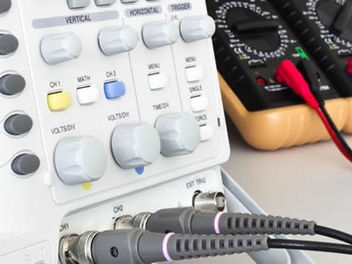Legal Requirements for Electrical Testing in the UK
- Guy hudson
- Jan 10, 2025
- 10 min read
Electrical safety is a critical concern for businesses, landlords, and property owners in the UK. The legal requirements for electrical testing are in place to ensure the safety of workers, tenants, and visitors by preventing accidents such as electrical fires and shocks. Failure to comply with these regulations can result in severe consequences, including fines, penalties, and legal liabilities. In this blog, we will explore the importance of electrical testing for safety and compliance, discuss the legal requirements governing electrical inspections, and highlight the risks and consequences of non-compliance.
Overview of Electrical Testing Regulations in the UK
In the UK, the legal requirements for electrical testing are outlined in several key regulations and standards. These include the Health and Safety at Work Act 1974, the Electricity at Work Regulations 1989, and the 18th Edition of the IET Wiring Regulations. Together, these laws and regulations ensure that electrical installations are safe, maintained, and regularly tested to prevent accidents.
The Health and Safety at Work Act 1974 places a duty of care on employers to ensure the safety and well-being of their employees. This includes ensuring that electrical installations are properly maintained and safe to use. The Electricity at Work Regulations 1989 further specify the need for regular testing and maintenance of electrical installations to prevent electrical hazards.
One of the most important aspects of electrical testing is the Electrical Installation Condition Report (EICR). This report is essential for both businesses and landlords, providing a detailed assessment of the condition of electrical installations and identifying potential risks. Electrical testing must be carried out at regular intervals to meet legal requirements and ensure compliance with safety standards.
The necessity of regular electrical safety inspections for businesses and landlords cannot be overstated. Electrical safety is vital not only for legal compliance but also to protect the people within a building or workspace. The risks of faulty electrical systems are real and can lead to devastating consequences such as fires or electrocutions.
Why Electrical Testing is Crucial for Businesses and Landlords
Protecting People and Property
Faulty electrical installations are one of the leading causes of fires in both residential and commercial properties. Electrical fires can cause extensive damage to property, as well as injuries or fatalities. A key component of electrical safety is regular testing to identify any faults or hazards in the system before they escalate. Electrical testing ensures that any potential issues are addressed, such as faulty wiring, outdated installations, or malfunctioning circuit breakers.
Electrical systems also have the potential to cause electric shocks if not maintained properly. This can be particularly dangerous for employees in a workplace, who may be at risk of injury due to faulty equipment or wiring. Regular electrical testing and inspections help to prevent these hazards by ensuring that all electrical systems meet safety standards and are functioning correctly.
Legal Obligations for Landlords
Landlords have a legal responsibility to ensure that the electrical installations in their rental properties are safe and compliant with UK regulations. The Electrical Safety Standards in the Private Rented Sector (England) Regulations 2020 mandate that landlords must have an Electrical Installation Condition Report (EICR) carried out at least every five years. This report must be conducted by a qualified, registered electrician, and a copy must be provided to tenants.
Failure to comply with this regulation can result in significant fines and penalties. Landlords may also be liable for damages if a tenant is injured due to faulty electrical installations. Ensuring that regular electrical testing is carried out not only keeps landlords compliant but also ensures the safety of their tenants, reducing the risk of accidents and legal issues.
Maintaining Business Continuity
For businesses, electrical testing is crucial for maintaining continuous operations. Electrical failures, such as power outages or system malfunctions, can cause significant downtime, disrupting business activities and costing money. These failures can occur unexpectedly if electrical systems are not regularly tested and maintained.
By carrying out regular electrical testing and inspections, businesses can identify potential issues before they result in system failure. This proactive approach helps to avoid costly repairs and reduces the need for emergency remedial work. Additionally, electrical testing can help to extend the lifespan of electrical installations, reducing the need for expensive replacements and repairs in the future.
Legal Requirements for Electrical Testing
Electrical Installation
The first step in ensuring compliance with electrical safety regulations is to have a qualified electrician carry out an initial inspection of the electrical installation. An electrical installation is any fixed wiring and associated systems used for electrical power distribution in a building, such as circuit boards, outlets, and lighting systems. Regular inspections of electrical installations are necessary to ensure they remain safe and fully operational.
Electrical Safety
Electrical safety is a priority for both businesses and landlords. In addition to complying with legal requirements, regular electrical safety testing helps to ensure that electrical systems are free from potential hazards, such as overheating wires, exposed cables, or faulty equipment. By maintaining a safe electrical system, businesses and landlords protect their staff, tenants, and visitors from potential electrical accidents.
Electrical Installations
Electrical installations must comply with the latest safety standards outlined in the IET Wiring Regulations and other relevant codes of practice. These regulations cover aspects such as the installation of circuit breakers, grounding systems, and the protection of electrical equipment. Ensuring that electrical installations meet these standards is essential for preventing accidents and ensuring legal compliance.
Electrical Test
An electrical test involves a series of inspections and measurements to assess the condition of electrical installations. This can include testing circuit breakers, continuity, insulation resistance, and earthing systems. Regular electrical testing helps identify faults that could pose a risk to safety and ensures that all electrical components are working as intended.
PAT Testing
PAT testing (Portable Appliance Testing) is an important part of electrical safety in the workplace. It involves checking the safety of electrical appliances and equipment, such as computers, kettles, and power tools. PAT testing is essential for businesses that use electrical equipment regularly, as it helps prevent electrical hazards caused by faulty appliances. It is also a legal requirement for many businesses to conduct PAT testing to ensure the safety of employees and customers.
Remedial Work
If electrical testing identifies any issues with electrical installations, remedial work may be required. This can include replacing faulty wiring, repairing damaged circuit breakers, or upgrading outdated electrical systems. Addressing these issues promptly helps to ensure that electrical installations remain compliant with safety regulations and reduces the risk of accidents or system failure.
Electrical Testing
Electrical testing is an ongoing requirement for businesses and landlords to ensure compliance with safety regulations. Electrical installations should be tested at regular intervals, typically every 5 years for commercial properties and every 3 to 5 years for rental properties. These tests should be carried out by a qualified electrician who can provide a detailed report on the condition of the electrical system.
Work Regulations
Work regulations outline the responsibilities of employers and property owners to ensure the safety of electrical installations in the workplace. Employers are legally required to ensure that electrical systems are regularly inspected and tested to protect employees from potential electrical hazards.
Safety Standards
Electrical systems must adhere to strict safety standards to prevent accidents and ensure the system is operating efficiently. These standards cover various aspects of electrical installations, including the correct installation of wiring, the use of circuit breakers, and the grounding of electrical systems.
Legal Requirement
It is a legal requirement for businesses and landlords to ensure that their electrical systems are regularly tested and compliant with safety regulations. Failure to comply with these requirements can result in fines, penalties, and, in the case of severe incidents, legal action. Electrical testing is a proactive measure to ensure compliance and avoid the risk of accidents.
Electrical Inspection
An electrical inspection is a comprehensive evaluation of an electrical system's safety and functionality. Inspections are essential for identifying potential hazards and ensuring that the system meets the necessary safety standards. Regular electrical inspections help businesses and landlords stay compliant with regulations and avoid costly repairs and liabilities.
Regulations Businesses Must Comply With and How Global Compliance Supports Them
Understanding and adhering to the relevant electrical regulations is essential for businesses to ensure compliance and avoid potential risks. In the UK, there are several key electrical regulations and standards that must be followed to maintain electrical safety in the workplace and rental properties.
Regulatory Overview: Key Electrical Testing Regulations for Businesses
One of the primary requirements businesses must meet is ensuring their electrical installations are safe and properly maintained. The Electrical Installation Condition Report (EICR) is a crucial document that businesses must obtain regularly. These reports assess the condition of electrical installations, identifying any potential issues that may present a risk. The frequency of these reports can vary depending on the type of business or building, with higher-risk environments needing more frequent inspections. High-risk industries such as manufacturing or hospitality might require annual inspections, while lower-risk environments, such as offices, may only need inspections every five years.
In addition to EICRs, businesses must comply with the wiring regulations (the 18th Edition of the IET Wiring Regulations) to ensure that their electrical systems are up to date with the latest safety standards. These regulations are regularly updated to reflect advances in technology and best practices, meaning that businesses must ensure their electrical installations adhere to the most current standards.
How Compliance Protects the Workforce
The primary reason for electrical testing and inspections is safety. Regular testing helps identify potential hazards before they cause accidents. Faulty electrical systems can lead to serious risks such as electric shocks, fires, and even fatalities. By maintaining compliance with legal requirements, businesses can protect their workforce from these dangers.
Electrical safety standards are designed to reduce risks associated with electrical installations. In workplaces, employers have a legal duty to ensure that employees are not exposed to hazardous conditions, and regular electrical testing is one of the ways to demonstrate that duty of care. Through regular periodic inspections, businesses can identify early signs of wear and tear in their systems, ensuring any faults are addressed before they escalate into more dangerous situations.
The Role of Global Compliance: Tailored Support for Businesses
Global Compliance is dedicated to helping businesses stay compliant with electrical safety regulations. Their expert team assists businesses in navigating the complexities of electrical safety requirements by providing tailored solutions. Whether a business operates in a high-risk industry or a low-risk one, Global Compliance ensures that testing schedules are customised to meet the unique needs of each company.
Global Compliance supports businesses by offering comprehensive services that include the creation of bespoke testing schedules, ensuring that businesses meet their legal requirements while avoiding unnecessary testing costs. Their team also provides expert advice on compliance, helping businesses understand their obligations and avoid costly mistakes.
Furthermore, businesses can rely on Global Compliance to deliver thorough installation condition reports that assess the overall safety of electrical systems, ensuring that all installations are safe, functional, and compliant with the most recent regulations.
The Positive Impact of Regular Electrical Testing Beyond Compliance
While meeting legal requirements is crucial, regular electrical testing offers several other advantages that go beyond just compliance. These benefits include fostering a safety-first culture, managing risks proactively, generating long-term savings, and building a trustworthy brand image.
Enhancing Safety Culture
A business that regularly conducts electrical safety inspections demonstrates its commitment to the wellbeing of its employees and customers. When businesses invest in regular electrical testing, it fosters a culture of safety that extends throughout the organisation. Employees are more likely to feel secure in an environment where safety is a top priority, which boosts morale and productivity.
In addition to internal morale, customers also take notice of businesses that prioritise safety. Whether it’s a restaurant, retail store, or office building, customers appreciate knowing that the business they engage with takes safety seriously. This can translate into increased customer trust and loyalty, ultimately enhancing the business's reputation.
Proactive Risk Management
One of the biggest advantages of electrical testing is its role in proactive risk management. Regular electrical testing allows businesses to identify potential issues before they escalate into major problems. For example, loose wiring or a malfunctioning circuit could lead to significant issues like power outages, fires, or electrical failures. With regular inspections, these problems can be caught early and resolved before they disrupt business operations.
By addressing potential hazards early, businesses can prevent costly repairs, downtime, and operational interruptions. This proactive approach not only keeps employees and customers safe but also saves money in the long term.
Long-Term Cost Savings
Regular electrical testing plays a significant role in extending the lifespan of electrical systems. By maintaining electrical installations and identifying faults early, businesses can prevent the need for expensive replacements or repairs down the line. For example, without proper testing, issues such as overloaded circuits or outdated wiring could lead to serious damage to the system, requiring costly remediation.
Preventing these issues through regular electrical testing and inspections helps businesses save money in the long run. Furthermore, businesses can often avoid significant downtime caused by unexpected electrical failures, keeping operations running smoothly and efficiently.
Building a Trustworthy Brand
In today’s competitive business landscape, trust is everything. Businesses that prioritise safety and compliance demonstrate their commitment to quality, which can have a direct impact on their reputation. A business that invests in portable appliance testing (PAT testing) and electrical inspections showcases its commitment to ensuring the safety of both employees and customers, which helps build a solid reputation for being a trustworthy and responsible organisation.
This commitment to safety can also provide marketing advantages. Customers are more likely to choose businesses that adhere to high safety standards, and showcasing these efforts can differentiate a brand from its competitors.
Conclusion
Electrical testing is essential for ensuring a safe and compliant environment for both businesses and property owners. Regular inspections, like the Electrical Installation Condition Report (EICR), not only help businesses meet legal obligations but also foster a culture of safety, manage risks, and generate long-term cost savings. By investing in electrical safety, you protect your workforce, enhance your brand’s reputation, and avoid costly issues in the future.
Global Compliance is here to support your business in staying compliant with all electrical regulations. With over 25 years of experience and a commitment to electrical safety, we offer nationwide services tailored to your needs. Trusted by leading schools, businesses, and agents, we provide comprehensive, high-quality services at competitive prices.
Ensure your electrical systems are up to standard with Global Compliance UK: Your Electrical Safety Partner. Contact us today at info@global-compliance.co.uk or call 0330 100 5341 to discuss how we can help you maintain a safe and compliant workplace. Let us handle the safety while you focus on running your business.



























Comments